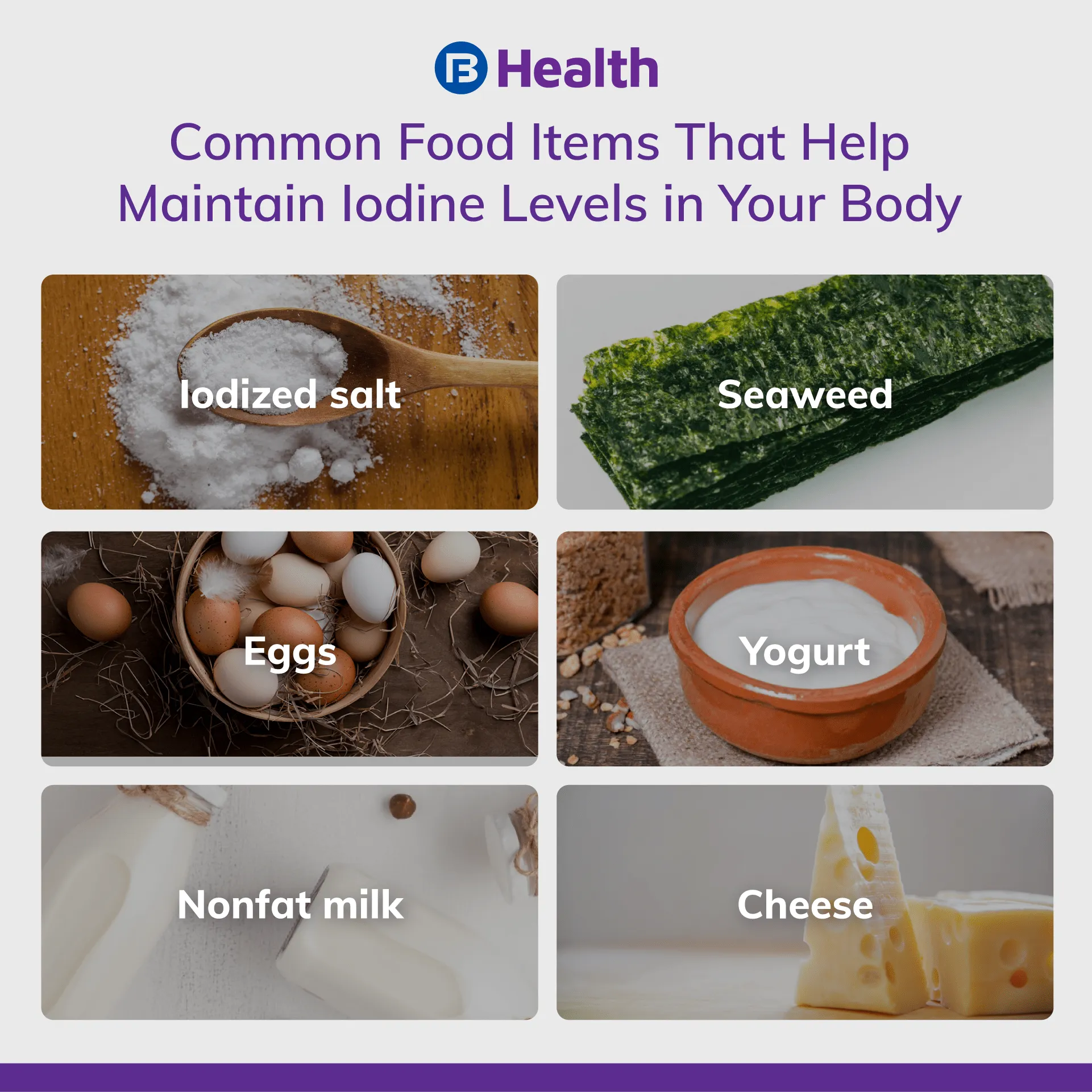Nutrition | 5 min read
7 Important Factors about Iodine Deficiency Disorders: What You Need to Know
Medically reviewed by
Table of Content
Key Takeaways
- Constipation, puffy face and fatigue are some iodine deficiency symptoms
- Iodine deficiency disorders include goiter and cretinism
- You can get an iodine deficiency test to check your iodine levels
Thyroid hormones are essential for your metabolism and other functions. Iodine is a mineral that helps in the production of these hormones. A deficiency of this mineral can lead to several health conditions. Because of this, it becomes essential to check iodine deficiency and start treatment at the earliest. Currently, there are nearly 2 billion people across the globe who have iodine deficiency, and among them, 50 million have medical conditions caused by it. In India, there isn’t a state where people do not have iodine deficiency disorders which makes it a prominent health concern.
Assessing the iodine levels through various methods has proven to be important in discussing the iodine deficiency treatment options [1]. Out of 167 million people at the risk of iodine deficiency disorder, 54 million suffer from the iodine deficiency diseases cretinism and goiter [2,3]. Read on to understand more about iodine deficiency symptoms, treatment, and prevention.
What is Iodine deficiency?
When there is a shortage of iodine in your body, you have an iodine deficiency. One of the best ways to tackle iodine deficiency is to ensure you consume the amount that your body needs. This can also help ensure that your thyroid gland and metabolism work properly. Iodine deficiency can lead to conditions such as
- Intellectual disability in babies
- Thyroid disease
- Permanent brain damage

What does iodine deficiency in children and women lead to?
Increased risk of thyroid conditions is a major and common effect of Iodine deficiency in children and women. It can also lead to other serious conditions in both women and children. Iodine deficiency in children can lead to
- Low IQ
- Brain damage
- Stunted growth
- Intellectual disability, including cretinism
Iodine deficiency in the women can cause
- Pregnancy issues like stillbirth, miscarriage, and nerve and brain damage to the developing fetus
- Fertility problems
Major symptoms of Iodine deficiency
Iodine deficiency mainly affects your thyroid gland. These effects include the presence of goiter, an enlarged thyroid gland, and hypothyroidism in some cases. In hypothyroidism, you have an underactive thyroid that reduces the production of thyroid hormones. This causes symptoms like
- Muscle weakness
- Constipation
- Feeling cold
- Constant tiredness or fatigue
- Weak or slow heartbeat
- Rapid weight gain
- Difficulties in remembering or learning
- Hair loss
- Dry skin
- Puffy face

What causes Iodine deficiency?
Your body cannot produce iodine naturally, so a major cause of iodine deficiency is insufficient consumption. Not only that, but soils now also lack iodine which in turn leads to a global deficiency of iodine. To tackle the large-scale deficiency, iodized salt is used by a lot of people. Although anybody can have an iodine deficiency, individuals at higher risk are:
- Breastfeeding mothers
- Pregnant women
- Fetuses
- Newborns
What is the diagnostic process for diagnosing iodine deficiency?
To diagnose iodine deficiency, doctors perform a physical examination and take a sample of your urine for testing. Apart from this, your doctor may also advise you to take a TSH blood test. This test checks the level of thyroid stimulating hormones in your blood. If the levels of TSH found are lower than normal ranges, you may have to undergo another test like an ultrasound so your health specialist can check your thyroid gland. In case you have iodine deficiency, consult with an endocrinologist to know your next steps.

What are Iodine deficiency treatment options?
Iodine deficiency is treated with the help of proper nutrition. Consuming iodine-rich foods is one of the best ways to improve your iodine levels. It is also what most doctors may recommend in the treatment plan. You can also take iodine supplements after consulting with your doctor. In the case of hypothyroidism, a synthetic thyroid hormone may be injected.
Additional Read: What is the Best Multivitamin for Women? Try These 5 Vitamins for Women!What do Iodine deficiency prevention measures include?
The most common and advisable method for preventing iodine deficiency is eating foods rich in iodine. You can also use more iodized salt in your food to avoid Iodine deficiency. Doctors may recommend iodine supplements to people who are at high risk of having iodine deficiency. Speak to a doctor to understand your need for iodine intake. Make sure you don’t exceed the recommended amount by food or supplements, as it can also negatively affect your thyroid.
If Iodine deficiency is diagnosed on time, it can be reversed completely with no or very few side effects. If it is identified at a later stage, it can cause complications, especially in children. Even after complications have taken place, you can make sure to get enough iodine to prevent them from becoming worse. Get an online doctor consultation on Bajaj Finserv Health to understand more or book an Iodine deficiency test. With the help of specialists, you can take care of conditions like these beforehand and keep a check on your overall health and well-being. Get expert guidance from the comfort of your home!
References
- https://www.ncbi.nlm.nih.gov/pmc/articles
- https://www.ncbi.nlm.nih.gov/pmc/articles/PMC3818611/
- https://www.downtoearth.org.in/blog/health/
Disclaimer
Please note that this article is solely meant for informational purposes and Bajaj Finserv Health Limited (“BFHL”) does not shoulder any responsibility of the views/advice/information expressed/given by the writer/reviewer/originator. This article should not be considered as a substitute for any medical advice, diagnosis or treatment. Always consult with your trusted physician/qualified healthcare professional to evaluate your medical condition. The above article has been reviewed by a qualified doctor and BFHL is not responsible for any damages for any information or services provided by any third party.
